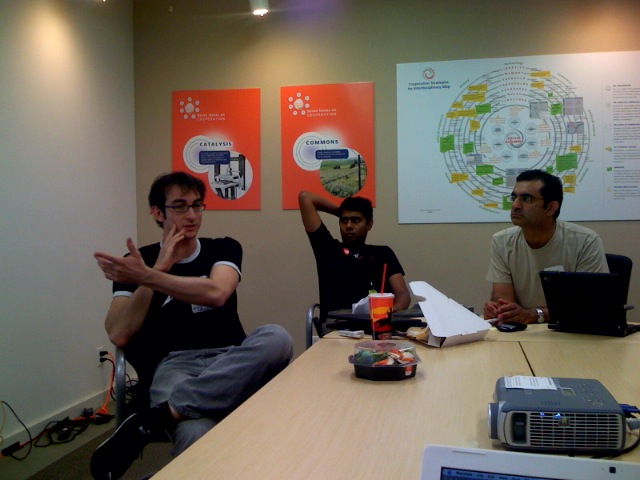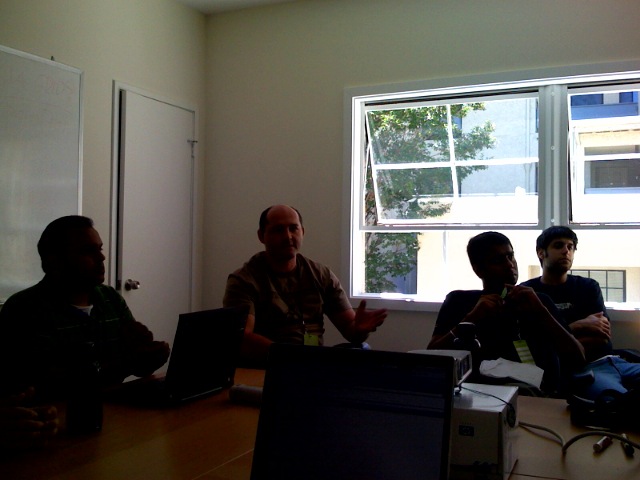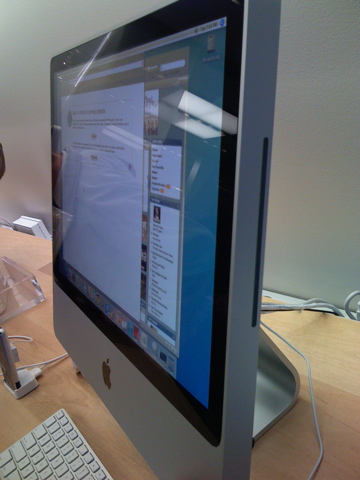August 2007 Archives
Led by: Tantek Çelik
why do i have to re-add all of my profile information, re-add friends, etc.?
what about change jobs? move?
base on assumption that user owns their own data - should be able to display profile information anywhere - need open standard to do this
need:
- profile info - vCard (rfc2426), hCard is the same thing, but on the web; doesn't do arbitrary key/value pairs, has 80/20 sweet spot of information; already social sites that, today, are publishing your info as hCard.
- friend list - no good standard
- Blog roles is a good analog
- XFN - add rel="friend", supported part of HREF; can do asymmetrical relationships
- Blog roles is a good analog
Satisfaction - they will import hCard information from other sites when you want to create a new account
Right model is to subscribe to hCard - just poll it, no special protcoal (like RSS) needed. Incombent on consumer to figure out the diff.
hCard only handles public information
OpenID - could be used to try export personal information. Give permission to 3rd party site to access OpenID. Uses website URL to prove that you are who you say you are.

Tantek Celik talking about social network portabilty.
XFN (xhtml friends network) - renders in a browser, but FOAF doesn't - FOAF is somewhat fuzzy as a standard
- It is HTML, just ad some extra elements to existing tags
- simple to understand
- supports differnent granularity for contacts - persion in your XFN list can be a contact, acquaintence, friend, family, etc. - will need import UIs that understand this and give this richness (only import family, etc)
- gmpg.org/xfn - homepage for XFN
can combine hCard and XFN - sprinkle in hCard information into XFN data. Add very little code to make it work. Sites like Cork'd, Dopplr (will import social network), LastFM, and Twitter already support this.
By default, always exporting - the page is the API, is the export.
If you change your URL, you can totally disconnect from your social network. could be bad, or could be what you want.
Identity consolidation - use rel="me" in XFN, to essentially denote that you are friending yourself - or yourself on another site
- need to do bidirection claim in order to verify that it really is the same person
- tantek.com claims twitter.com/t, and twitter.com/t claims tantek.com. Can know that Tantek owns both URLs.
Want vendors to compete to be more open.
ClaimID - identity, also do microID (hash of e-mail address).
Do simple things, evolve simple stanards, make building blocks (the UNIX way), add more complex feature if needed.
Doing this stuff, hCard and XFN, puts you on the open social web.
Technorati Tags: BarCamp, BarCampBlock, XFN, hCard, Social Software
It seems like whenever you have a talk about mobile software, it devolves into converstation about everything that is wrong with the space (constrictive nature of the carriers, all phones have different properties, hard to develop for, hard to get users to adopt things, etc.). But, I thought that we got to some interesting points in this conversation, about mobile applications that can work today. You have to think simpler, and base things on SMS and WAP. Everybody wants to do cool things with location-based services and whatnot, but the technology just isn't there yet.
My notes follow.
led by: jordy, social games at digital chocolate, bebo.com
skyhook - company in boston, makes a firefox extension (loki) - senses nearby wifi networks, tries to triangulate your location based upon SSIDs that it can see (they built a DB that maps SSID to location)
standards in mobile
- WAP is pretty much a standard
- SMS is finally a standard (as of like 2 years ago)
if you get embedded on the phone - you're golden. People don't download java apps to phone (too hard, poor experience, etc)
barriers to entry
- downloadable apps - have to do engineering per phone
- barriers on cost side - costs money sms (e-mail to sms gateway works for hackers)
- distribution - have to find ways to get people to find your app
- usability - if it isn't sms or wap, people probably won't figure it out and use it

admob - mobile ads, works in wap browser; can target ads per country, operator, handset, etc.
- any hacker dude can add admob to their mobile site
- also, can buy ads, to help distribution
wurfl - open source mobile device db
Papers and other sources:
- social network graph - brad fitzpatrick - apparently, Brad gave a talk on this on the first day of BarCampBlock, that everybody was talking about.
- social network aggregator - bunch of startups in this area, can find via mashable.com
twitter is another great example of what can work in mobile - so stupid simple, which is key to their success
mobilemonday.net - tracks mobile industry news, has pointers to lots of other good stuff
Talk by - Erich Nachbar
CarrierIQ - OpenVZ virtualization
case for virtualization - make servers that are idle do useful work. more about efficiency per unit of space/watt
types of virtualization
- hardware emulation - parallels, vmware - can run any OS unmodified. Cons are that it is hard to manage, performance hit (especially with system calls), static resource allocation (vmware can sortof get around this), density is low (# of VMs per server)
- para-virtualization - run multiple kernels (XEN 2 - bundled with RH5, UML).
- Typically better performance (cuts out some layers of translation)
- cons: requires modification of guest OS, static resource allocation
- Typically better performance (cuts out some layers of translation)
- OS level virtualization - run only one kernel
- Native performance, dynmaic resource allocation, cheap fast (can make new virtual instance in seconds), much easier to manage.
- con: same kernel per virtual server, no mix of operating systems on one server
- examples: OpenVZ (stable, works well), Virtuozo, FreeBSD jails, Linux-Vserver, Solaris Zones
- Native performance, dynmaic resource allocation, cheap fast (can make new virtual instance in seconds), much easier to manage.

Erich talking about OpenVZ
XEN isn't ready for prime time (not production grade - stability issues?)
OpenVZ has templates - for different distros
OpenVZ is basically Solaris Zones, but open source, and works entirely on Linux. Install procedure on CentOS requires a new kernel (because they have lots of patches to virtualize certain things in the kernel), and some tools RPMs.
I'm at BarCampBlock in Palo Alto today, and the second talk that I went to was about a new OSS-driven service, Worldwide Lexicon.
Worldwide Lexicon - user contributed language translations of Internet content
- produce tools that webservice providers and publishers can use to produce websites in multiple languages
- like wikipedia - users produce translation
- popular sites will have bilingual users in their population - low percentage in US, much higher in the rest of the world
- want to make system accessible to wide range of websites - via plugins for popular CMS systems, etc.
- add links to blog posts - to translate it to different languages. Look at IP/browser preferences to suggest a language.
- click on edit - brings up an editor that floats on top of the text, for editing the translation.
- Have Wordpress and generic PHP, coming with Movable Type, and possibly Drupal. It is an open source project, so it is possible to easily add support for other platforms.
Brian McConnell, talking about Worldwide Lexicon at BarCampBlock
http://marx.worldwidelexicon.org - more of an admin site
- powered by PHP and cake
- working on a commercial system that'll be out later this year - publishers will be able to list what translation they want done, and list a price (i.e. $.50/paragraph), then it will be up to translator to decide if they want to accept
- governments (particularly EU) might be interested in using this for translation.
- Could extend this framework to translate UI of website, not just content.
user motivations - people who want to keep their language skills up, people who want to share text with friends/family that don't speak the source language, etc.
copyright issues
- translation is a derivative work, translator doesn't have any rights - copyright goes to original author?
- can do it so that they don't steal page views - route all traffic to translate articles through original publishers site.
Education applications
- there are a lot of ways to use this for teachers and students
- could have students do translations of content for assignments - makes it more relevant to them, etc.
http://twitter.pbwiki.com/Clones - shows how there is a market for translated applications.
- People want to be able to see a UI in their own language, and with local idomatic expressions, etc.
Technorati Tags: BarCampBlock, BarCamp, Worldwide Lexicon, Wiki, Translation
While I've been far to busy to blog (I have a half-written post about Japan that I really need to tend to), I am going to miss some sleep to post about Apple, which I also haven't done for awhile. Just because I haven't been writing in my blog about Apple, doesn't mean that I'm not thinking about them incessantly.
I have been in the mood to upgrade my primary Mac, an iMac G5 2.1Ghz (the last PowerPC iMac released) for awhile now. The new Intel-based Macs are just stupid fast, and I'm only human.
However, while I am pretty satisfied with the form factor of my current iMac, I've been in more of a desktop mood lately. So, I was kindof hoping that Apple would have some more significant hardware announcements today - like a really beefed up Mac mini, or a much cheaper Mac Pro. Instead, we got this:

The new iMac, glossy glare and all.
Generally speaking, the upgraded specs and lower price of the new iMacs are quite tempting to me. So while I was in San Francisco tonight, I hopped over to the Apple store gave the new iMac a once-over. First off, I must admit that the aluminum finish looks much better in person than it does photographed. And the new iMac does appear to be a lot smaller than the model that it replaces. But that glossy display -- it is really turning me off. When you look dead on at it, it's pretty reasonable. But as you can see from the photo I posted above (taken by my iPhone, btw), viewing this display from the side shows all sorts of glare. I also found the viewing angle of the LCD to be a bit worse than my current iMac -- when looking at it from above, the colors were really washed out (Update: confirmation that the LCD isn't as good in the new 20" iMac from Macintouch).
As for the new keyboard, it certainly looks neat:

The new iMac keyboard - it certainly is thin.
But in the limited amount of typing that I did on it, the new keyboard didn't feel very comfortable. It's a moot point for me (I'm a diehard Kinesis man now), but I think that the new iMac keyboard is yet another example of Apple placing form over function.
In general, I'm not really happy with Apple's current Mac lineup. I think Apple's portables are actually pretty fantastic - and they are the main reason why Apple has been selling more Macs than ever the past few quarters (the MacBook, in particular, is killer). However, if you're not in the market for a portable, your choices on the Mac side are pretty thin. The Mac mini is under-powered for the price (integrated graphics, 5400 rpm disk), and the Mac Pro is way overpowered (with a corresponding price).
I think that Apple is making a pretty big mistake in not being more aggressive with the Mac - they're on a roll, and they should be doing everything in their power to attract as many people as they can to the platform. If Apple's management isn't worried about cannibalizing iPod sales with the new iPhone, why are they worried about cannibalizing iMac or Mac Pro sales with a super-duper Mac mini? Even though the Mac community has been talking about this for years, I really think that it's time for the xMac - the only question, at this point, is if Apple has the stones to make one.
It looks like I shouldn't hold my breath on this one - my guess is that Apple is going to stay on their current course of form over function, and "not shipping junk" - thus ultimately limiting how much they can grow the market-share of the Mac. And since everything that Apple does (the iPod, the iPhone, Apple TV, etc) ultimately grows out of the Mac - I think not investing in the Mac is a pretty huge mistake for Apple. If I were a shareholder, I'd be pretty unhappy about this. Yet as long as Apple keeps posting fabulous profits, I don't expect that the shareholders or analysts are going to pay any attention to the deficiencies in the Mac lineup.
Quite a shame.
-Andy.
Update: I was going to write an additional post about the need for an xMac, but I found today that Don MacAskill (who is super-cool btw, I met him at Foo Camp) has summed things up better than I ever could.
Technorati Tags: Apple, Macintosh, iMac, xMac, keyboard, Kinesis
